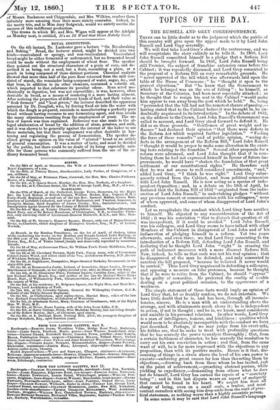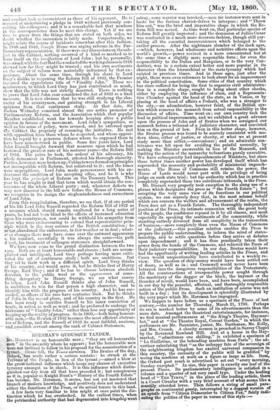TOPICS OF THE DAL
THE RUSSELL AND GREY CORRESPONDENCE.
THERE can be little doubt as to the judgment which the public of this country will give upon the appeal made to it by Lord John Russell and Lord Gtey severally. We will first take Lord Grey's share of the controversy, and we will recapitulate the story entirely as he tells it. In 1849, Lord John Russell committed himself to a pledge that a Reform Bill should be brought forward. In 1851, Lord John Russell being still Premier, the subject of franchise extension came before the Cabinet ; it was repeatedly discussed, and Lord Grey consented to the proposal of a Reform Bill on very remarkable grounds. He "never approved of the bill which was afterwards laid upon the table of the House of Commons ; " he "thought it open to the gravest objections." But "he knew that the Government to which he belonged was on the eve of falling" ; he himself, as Secretary of the Colonies, had been most especially attacked ; so he thought that to resign his seat in the Cabinet "would make him appear to run away from the post which he held." So, being "persuaded that the bill had not the remotest chance of passing,— having stated that to the Cabinet before it was brought in, he un- doubtedly acquiesced in its introduction." In the debate of 1852, on the address to the Crown, Lord John Russell's Government was called to account, and Lord Grey stood forward to defend it. He did so on these grounds. "Gentlemen of great weight and in- fluence" had declared their opinion "that there were defects in the Reform Act which required further legislation." "Feeling the force of these remarks" and of public opinion, "seeing de- fects in the arrangement of the Reform Bill," Lord John Russell "thought it would be proper to make some alteration in the exist- ing laws relating to the franchise." Several other proposals for a reform were advanced, and Lord John thought that if in com- bating them he had not expressed himself in favour of future im- provements, he would have "shaken the foundation of that great settlement of our constitutional rights." He therefore said that he was not averse to well considered amendments, "and," added Lord Grey, "I think he was right." Lord Grey subse- quently retired from the Cabinet, and from political connexion with Lord John Russell. He is now acting as a species of inde- pendent Opposition ; and, in a debate on the 19th of April, he declared that the Reform Bill of 1852 "originated from the indis- cretion of Lord John Russell," in undertaking pledges "without any previous concert or communication with his colleagues," none of whom approved, and some of whom disapproved of Lord John's conduct.
Let us recapitulate the conduct which Lord Grey here ascribes to himself. He objected to any reconsideration of the Act of 1832 ; it was his conviction "that to disturb that question at all
was inexpedient, if it could be avoided." Lord John Russell, - was his colleague, and Lord Grey seems to have talked with other Members of the Cabinet in disapproval of Lord John and of his indiscretion of pledging himself to a reform. Yet two years afterwards, and even three, we find Lord Grey consenting to the introduction of a Reform Bill, defending Lord John Russell, and declaring that he thought Lord John " right " in crossing the path of indiscreet measures with a more discreet Reform Bill. Now, indeed, he tells us that such was not his real opinion ; that he disapproved of the man he defended, and only consented to sanction the bill proposed, "because he believed it never would. be carried." Thus Lord Grey'sequiesced in defending a colleague, and opposing a measure on false pretences, because he thought that if he were to retire from the Cabinet, he should " appear " to be guilty of cowardice. He preferred the reality of double dealing on a great political occasion, to the appearance of a weakness.
The simple statement of these facts would imply an opinion of Lord Grey that, let us frankly confess, we do not entertain. We have little doubt that he is, and has been, through all inconsis- tencies, sincere. He is a man with an understanding above the average, and with attainments much above it ; he is independent in action, if not in thought ; and he is, we know, most considerate and amiable in his personal relations. In other words, Lord Grey is a man of intelligence, honour, and kindliness ; qualities which would seem to be absolutely incompatible with the conduct we just described. Perhaps, if we may judge from his oyertrads, his foibles are, that he seeks to treat with profundity questions that he has scarcely the power to analyze thoroughly ; that, from a certain feebleness of character, he has scarcely the resolution to carry out his own conviction in action ; and that, from the same want of will, he is far more impressed with the objections to any proposition, than with its positive merits. Hence is it that, dis- coursing of things in a strain above the level of his own power to execute—enforcing great causes far less than thwarting them by objections,—drawing back from those whom he has incited, just on the point of aohievement,—preaching abstract purism, while yielding to expediency,—demanding from others what he does -- not do himself, Lord Grey has earned the repute of a " orotehetY being " ; and in this last dispute wears an aspect of malignity.' that cannot be found in his heart. We acquit him from ant eharge of being, even on a small Boole, a traitor, and mus content ourselves with seeing him drop aside from the rank ofrpr:e- tical statesman, as nothing worse than a highly sown _ peso . In some sense it may be said that Lord John Russell's language and conduct look as inconsistent as those of his opponent. He is accused of undertaking a pledge in 1849 without previously con- sulting his colleagues ; and it is a remarkable fact that nowhere in the correspondence does he meet this charge. Yet if we are free to guess from the things that are stated on both sides, we doubt whether the accusation is fairly made. Conjecturally, we might relate the course of incidents somewhat after this fashion. In 1848 and 1849, Joseph Hume was urging reforms in the Par- liamentary representation. If there were any discussions on the sub- ject in the Cabinet, nothing occurred of a kind so marked as to force itself on the recollection of Lord John ; but he, personally, was struck with the factthat the conduct of the working classes in 1848 showed how far they might be trusted ; and his own sentiments en the subject of reform were materially influenced by that ex- perience. About the same time, through his share in Lord Grey's dislike to reopening the Reform Bill of 1832, the Premier incurred the opprobrious title of "Finality John." These re- miniscences to which Lord Grey has just contributed so much, show that the title was not strictly deserved. There is nothing to prove that Lord John ever considered the Act of 1832 as a final measure. It is now obvious that he was still studying the cha- racter of his countrymen and gaining strength in his Liberal opinions from that continuous study. At that date, Sir Joshua Walmsley remained almost the one active promoter of Parliamentary Reform, and the Association which that popular Member established went far towards keeping alive a public opinion in favour of the movement. Lord John's sympathies, as well as his sense of policy, were aroused, and he enforced upon the Cabinet the propriety of resuming the initiative. He met with opposition from those whom he respected, and whose opposi- tion he repaid by a generous defence where he supposed them to have been misconstrued in public. Some five years later, Lord John Russell brought forward that measure upon which he had bestowed the greatest care of his maturer years—the Reform Bill of 1854. The pains he took, the ardour of his advocacy, his whole demeanour in Parliament, attested his thorough sincerity. Parties, however, were broken up ; Cabinets were formed on principles not incompatible with Reform, but collateral to it ; and the times were unpropitious. Lord John made perseverance with his en- deavours the condition of his accepting office, and he it is who has kept the principle of Reform on the Treasury bench. This year he has sought to find that term which w9uld obtain the con- currence of the whole Liberal party ; and, whatever defects we may now discover in the bill now before the House of Commons, we recognize in its design the singlemindedness and earnestness of Lord John.
From this recapitulation, therefore, we see that, if at one period of his life Lord John Russell regarded the Reform Bill of 1832 as a measure which should remain unaltered for a long series of years, he had not been blind to the effects of increased education upon his countrymen, nor could he withhold his sympathy from those who were endeavouring to extend that representative prin- ciple which is the very essence of the British constitution ; he 31f vex-abandoned the endeavour, in fair weather or in foul ; what-
er changes there may have come over the outward appearance a his conduct, essentially it was always the same—his path (Fred, his treatment of colleague statesmen straightforward. We have now come to the grand distinction between the two lien. Both are at heart honourable and sincere ; both are accom- plished and intelligent, Lord Grey perhaps having more culti- vated the art of continuous study - both are ambitious. But they set to their work in a different spirit. Lord Grey thinks of his country, and would serve it, but he thinks first of Henry George, Earl Grey ; and if he has to choose between absolute devotion to the public weal or the appearance of some- thing derogatory- to Henry George, we see what course he takes. Lord John Russell thinks also of John Russell, is ambitious to win for that person a high character, and to identify him with the progress of his country. And he has suc- ceeded, as others of his race have centuries back. But he thinks of John in the second place, and of his country in the first. He has been ready to sacrifice Russell to his inner conviction of truth, in action as well as word ; and he preferred to undergo the nickname of "Finality John," rather than lose any opportunity of keeping up the reality of progress. So in 1860,—both being honour- able men,—the Howick of 1832 becomes the most efficient obstruc- tor of Reform, and the Russell of 1832 its most faithful, anxious, —and unselfish servant among the rank of Cabinet Statesmen.



























 Previous page
Previous page